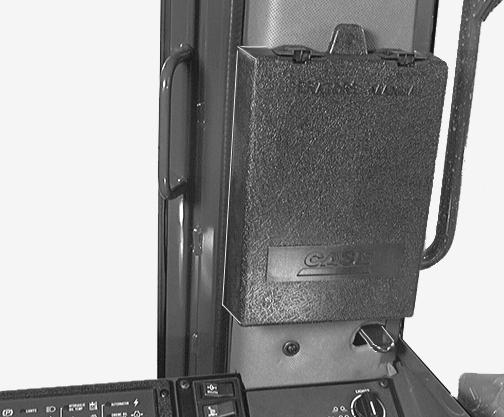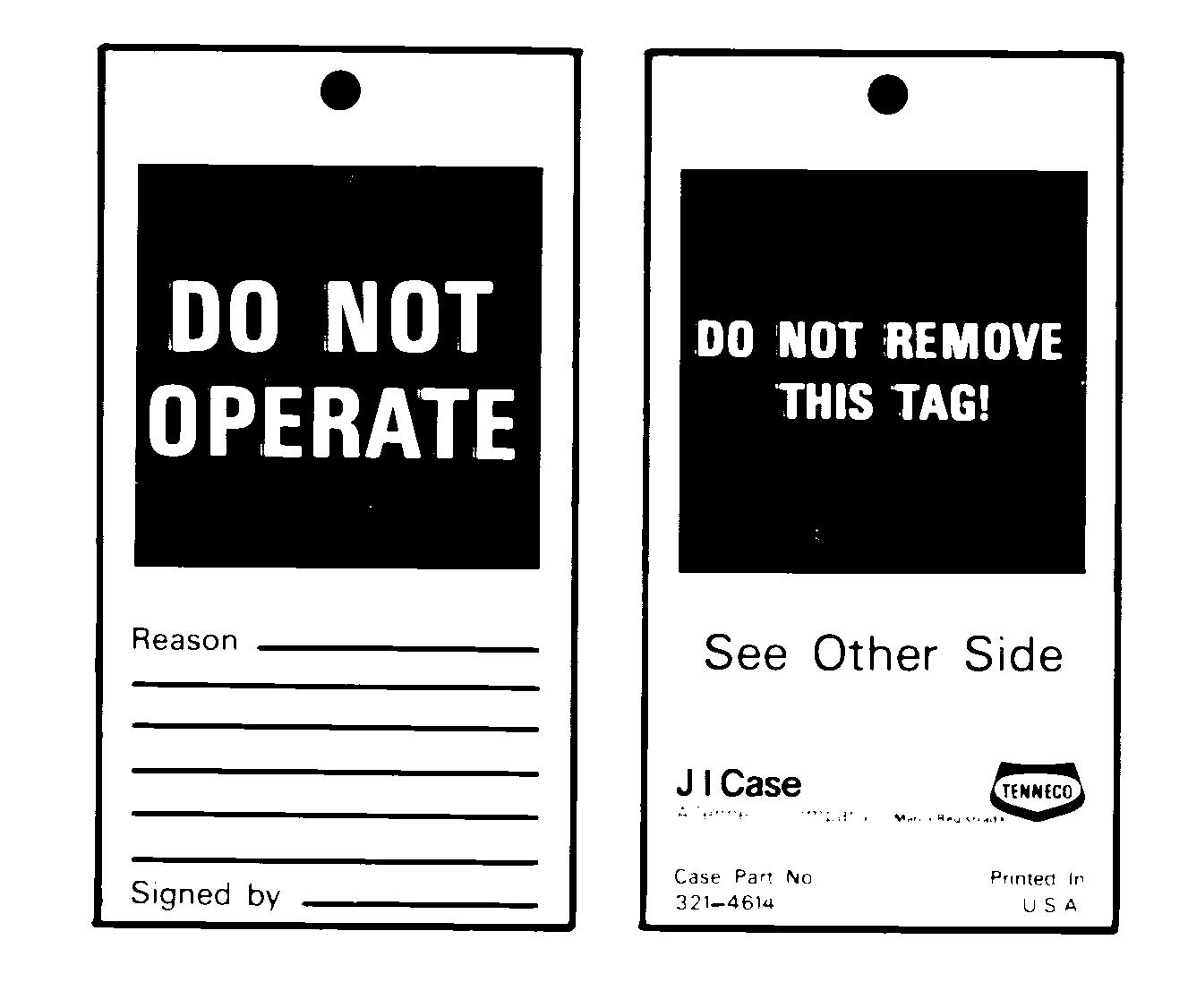
8 minute read
SAFETY DECALS
SAFETY RULES
!
Most accidents involving machine operating and maintenance can be avoided by following basic safety rules and precautions. Read and understand all the safety messages in this manual, the safety manual and the safety signs on the machine before you operate or service the machine. See your dealer if you have any questions.
The safety information given in this manual does not replace safety codes, insurance needs, federal, state or local laws. Make sure that your machine has the correct equipment according to these rules or laws.
READ THIS MANUAL COMPLETELY and make sure you understand the controls. All equipment has a limit. Make sure you understand the speed, brakes, steering, stability and load characteristics of this machine before you start to operate.
DO NOT remove this manual or the safety manual from the machine. See your dealer for additional manuals. Also see the manual information on the inside of the rear cover of this manual.
OPERATORS MANUAL STORAGE BOX
RD97D063
IMPORTANT: Safety messages in this section point out situations which can happen during the normal operation and maintenance of your machine. These safety messages also give possible ways of dealing with these conditions.
Additional safety messages are used in the text of the manual to show specific safety hazards.
THIS SAFETY ALERT SYMBOL INDICATES IMPORTANT SAFETY MESSAGES IN THIS MANUAL. WHEN YOU SEE THIS SYMBOL, CAREFULLY READ THE MESSAGE THAT FOLLOWS AND BE ALERT TO THE POSSIBILITY OF PERSONAL INJURY OR DEATH. M171B TRIM THIS EDGE
5
TRIM THIS EDGE
RIGHT PAGE
Template Name: OM_1_colTemplate Date: 1994_04_29
Template Date: 1994_04_29Template Name: OM_1_col
TRIM THIS EDGE
BEFORE OPERATION
!
● Different jobs will require different protective equipment. Items such as hard hats, protective shoes, heavy gloves, reflector type vests, respirators and ear protection can be required. Know and use the equipment that is required before you start the job.
● Be prepared for emergencies. Always have a first aid kit and a good fire extinguisher with you and know how to use each.
● Know the hand signals used on your job. Follow the instructions of the flagman, signs, etc.
See Pages 18 through 20.
● Know the rules, laws and safety equipment necessary for transporting or driving this machine on a road or highway. Rotating beacon, backup alarm, SMV symbol and other safety equipment items are available from your dealer.
● Avoid loose fitting clothing, loose or uncovered long hair, jewelry and loose personal articles.
● Foreign material or grease on the steps and hand rails can cause an accident. Keep the steps and hand rails clean.
● Always use the hand rails when mounting or dismounting from the machine. Always face the machine when mounting or dismounting. This will provide more secure hand and foot mobility to help prevent slipping and possible injury.
● Remove all loose objects from the operators area and from the machine. Loose objects can jam controls and cause accidents.
● Operate controls only when seated in the operators seat.
● Before starting the engine, securely fasten your seat belt. Your machine is equipped with a
ROPS cab or canopy for your protection. The seat belt can help protect your safety if it is used correctly and maintained. Never wear a seat belt loosely. Never wear the belt in a twisted condition or pinched between the seat structural members.
● Make sure all persons are away from the machine before you start the engine.
● Before starting the engine, be sure all operating controls are in NEUTRAL and the parking brake is applied.
6
TRIM THIS EDGE
LEFT PAGE
MACHINE OPERATION
!
● Do not turn the steering wheel until everyone is clear of the machine and the center pivot area.
● Check all controls in a clear area and make sure the machine is operating correctly.
● A frequent cause of personal injury or death is persons falling off and being run over. Do not permit other persons to ride on the machine. Only one person - the operator - must be on the machine when it is in operation.
● Engine exhaust fumes can cause death. If you operate this machine in an enclosed area, use good ventilation to replace the exhaust fumes with fresh air.
● Dust, fog, smoke, etc., can decrease your vision and cause an accident. Stop the machine or decrease the speed until you can see everything around you in the work area. ● Contact with overhead power lines can cause severe electrical burns or death from electrocution. Make sure there is enough clearance between the machine and overhead power lines. ● Electrical cables, gas pipes, water pipes or other underground objects can cause injury or death. Learn the location of underground hazards before you operate your machine in a new area.
● If this machine rolls over you can be injured or killed. You must make a judgment if weather, road or earth conditions will permit safe operation on a hill, ramp or rough ground. ● Stay away from natural hazards, such as ditches, overhangs, etc. Walk around the work area before you start and look for hazards.
● Be alert and always know the location of all persons in your area. Keep all other persons completely away from your machine. Injury or death can result if you do not follow these instructions.
● Keep the loader bucket low when moving around the work area. Be careful when you raise the load to dump.
PARKING THE MACHINE
!
● When you park the machine and before you leave the operators area, always lower the loader bucket to the ground, apply the parking brake and stop the engine.
7
TRIM THIS EDGE
RIGHT PAGE TRIM THIS EDGE
Template Name: OM_1_colTemplate Date: 1994_04_29
Template Date: 1994_04_29Template Name: OM_1_col
TRIM THIS EDGE
MAINTENANCE
!
● Before you service the machine, put a DO NOT OPERATE tag on the instrument panel. A
DO NOT OPERATE tag (Case Part Number 321-4614) is included with each new machine.
Extra tags are available from your dealer.
● Improper service or repair can cause injury or death. If you do not understand a service or adjustment procedure, see the Service Manual for this machine or see your dealer. ● Unauthorized modifications to this machine can cause injury or death. Do not make unauthorized modifications to this machine.
● If you must service this machine with the engine running, have another person help you.
Follow the instructions in this manual or the Service Manual. Do not leave the operators seat with the engine running.
● Keep clear of the center pivot area of this machine when the engine is running unless the transport/service link is in the LOCKED position. After service, return the transport/service link to the OPERATING position. ● Metal chips or debris can cause eye injury. Always wear eye or face protection especially when you use a hammer on this machine. Use a hammer with a soft face, such as brass, to drive hardened pins.
● Hydraulic fluid or grease injected into your skin can cause severe injury or death. Keep your hands and body away from any pressurized leak. If fluid is injected into your skin, see a doctor immediately and have the fluid removed.
● If you must service the machine with the loader raised, always block the loader arms.
● When you service this machine, always wear face or eye protection, safety shoes and other protective items as required.

B901248J
8
TRIM THIS EDGE
LEFT PAGE
BURN PREVENTION
!
● Battery acid causes severe burns. Batteries contain sulfuric acid. Avoid contact with skin, eyes or clothing. Antidote - EXTERNAL: flush with water. INTERNAL: drink large quantities of water or milk. Follow with milk of magnesia, beaten egg or vegetable oil. Call a doctor immediately. EYES: flush with water for 15 minutes and get prompt medical attention.
● When the battery electrolyte is frozen, the battery can explode if (1) you try to charge the battery or (2) you try to jump start and run the engine. To prevent the battery electrolyte from freezing, try to keep the battery at full charge. If you do not follow these instructions, you or others in the area can be injured.
● Hot coolant can spray out if the radiator cap is removed. To remove the radiator cap, let the cooling system cool, turn to the first notch, then wait until the pressure is released.
FIRE OR EXPLOSION PREVENTION
!
● Engine fuel can cause an explosion or fire. Do not fill the fuel tank with the engine running if you are near an open fire or if you are welding, smoking, etc.
● Use nonflammable cleaning solvent to clean parts.
● Sparks or flame can cause the hydrogen gas in a battery to explode. To prevent an explosion do the following:
1. When disconnecting the battery cables, disconnect the negative (-) cable first; when connecting the battery cables, connect the negative (-) cable last.
2. When connecting jumper cables to start the engine, use the procedure shown in this manual (see Page 58).
3. Do not short circuit the battery posts with metal items.
4. Do not weld or grind or smoke near a battery.
● Sparks from the electrical system or engine exhaust can cause an explosion and fire.
Before you operate this machine in an area with flammable dust or vapors, use good ventilation to remove the flammable dust or vapors before you start.
9
TRIM THIS EDGE
RIGHT PAGE TRIM THIS EDGE






